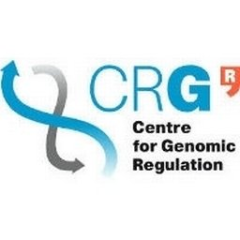Post-doctoral Researcher Precisiontox - Barcelona, España - Center for Genomic Regulation
Descripción
The Institute
The Centre for Genomic Regulation (CRG) is an international biomedical research institute of excellence, based in Barcelona, Spain, with more than 400 scientists from 44 countries.
The CRG is composed by an interdisciplinary, motivated and creative scientific team which is supported both by a flexible and efficient administration and by high-end and innovative technologies.
In April 2021, the Centre for Genomic Regulation (CRG) received the renewal of the 'HR Excellence in Research' Award from the European Commission.
This is a recognition of the Institute's commitment to developing an HR Strategy for Researchers, designed to bring the practices and procedures in line with the principles of the European Charter for Researchers and the Code of Conduct for the Recruitment of Researchers (Charter and Code).
Please, check out our Recruitment PolicyThe role
PrecisionTox is an European funded project, the overarching aim of which is to establish a new, 3Rs
- compliant (Replacement, Reduction, Refinement), cost-effective testing paradigm for chemical safety assessment — Precision Toxicology — that revolutionises regulatory toxicology, replaces animal testing, reduces uncertainty, and determines safety factors in assessing risks to human health. This goal will be accomplished by identifying molecular key event (KE) biomarkers, predictive of chemically induced adverse health effects in humans, that feed directly into regulatory and industry practice via the systematic use of distantly related animal species from across the tree of life and the highly interdisciplinary mix of genomics, metabolomics, evolutionary theory, quantitative genetics, data science, toxicology, and law.
Within this project, our group at the CRG focuses on the the analysis of bulk and single cell RNA-seq from five different model species (Danio, Xenopus, Caenorhabditis, Daphnia and Drosophila),human cell lines and organoids after treatment with selected putative cardio, neuro, and hepatotoxic compounds emerging from other efforts within PrecisionTox Our aim is to employ existing and develop novel computational approaches to assess the impact of the chemical compounds on gene expression or co-expression networks across the model species, and explore their predictive potential for human toxicity assessment.
This project fits overall within a larger overarching goal in our group of developing methods to relate genome to phenome across the tree of life.
We are searching for a talented post-doctoral researcher with a strong computational background to join the group.About Guigo's lab**The overarching theme of the research in our lab is the understanding of the information encoded in genomic sequences, and how this information is processed in the pathway leading from DNA to protein sequences. More specifically, we are interested in the epigenetic regulation of gene expression and RNA processing, the relationship between molecular phenotypes and higher order endophenotypes and organismal phenotypes, and the identification of functional regions on the genome of all living beings. Our group is mostly computational, and we do both large-scale data analysis and development of methods, but it has also an important experimental component. We participate in many large scale international functional genomics projects, such as ENCODE, GTEx, BluePrint and others.
Whom would we like to hire?
Must Have:
- Strong computational background
- Experience in the analysis of largescale omics data, specifically (single cell/bulk) RNAseq. Experience with metabolomics data analysis or QTL analysis and quality control would be a plus
- Experience in the development and/or implementation of algorithms and/or computational pipelines
- Background/experience in building statistical and/or machine learning methods, in particular for data integration tasks, would be a plus
- Previous experience in building and interacting with relational databases (e.g., PostgreSQL) and APIs would be a plus
Education and training
- PhD in Bioinformatics or in Biology, Machine Learning, Statistics, Physics, Mathematics, Chemistry or related areas
Languages:
- Highly proficient in both spoken and written English
Technical skills:
- Strong programming skills in R or Python. Additional experience in, for example, C, C++, MATLAB, or Julia would be a plus
- Data visualisation
- Bash scripting in a Linux environment, ideally tailored to an HPC infrastructure
- Multivariate statistics
- Containerized workflows and DSLs, e
g:
Nextflow, SnakeMake
- Familiarity with deep learning libraries like TensorFlow and Pytorch would be a plus
- Collaborative tools
Competences
- Project management
- Interdisciplinary research
- Capacity to work independently, but also ability to interact with others, both with colleagues within the group and from the project consortium
- Good (academic) writing and presentation skills
- Imagination, Motiva
Más ofertas de trabajo de Center for Genomic Regulation
-

Accounts Receivable Officer
Barcelona, España - hace 3 semanas
-

Bioinformatician for Cancer Genomics Data Analysis
Barcelona, España - hace 1 día
-

Phd Position at The Computational Biology of Rna
Barcelona, España - hace 1 semana
-

Genomics Data Analyst
Barcelona, España - hace 2 semanas
-

Bioinformatician - Single Cell Epigenomics and
Barcelona, España - hace 2 semanas
-

Training and Academic Officer
Barcelona, España - hace 4 días
